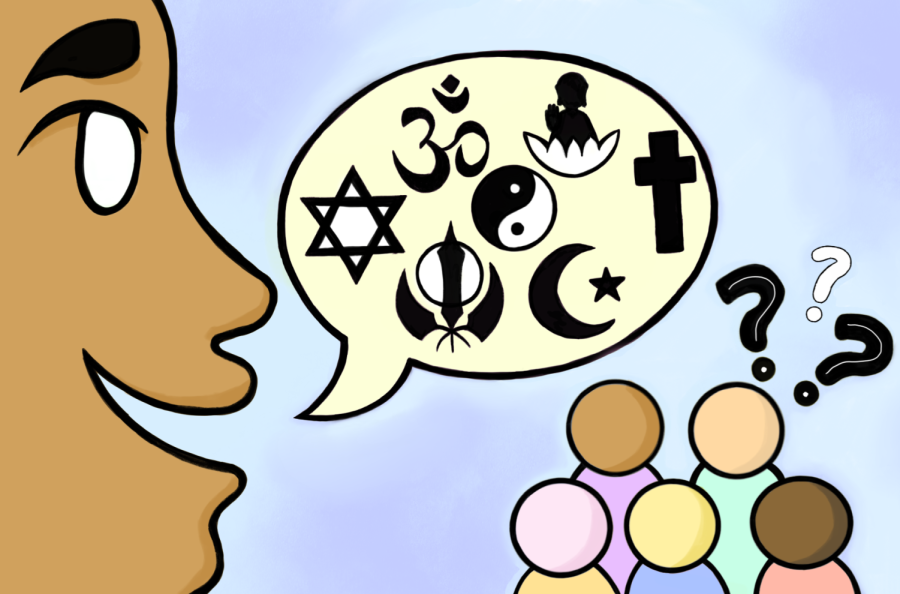Teaching religious diversity: Evanston students, educators reflect on how schools discuss religion in light of new law
A new Illinois state law now requires history classes to teach about the contributions of Americans of different faiths. Some ETHS students think the current curriculum falls short in discussing religion.
April 21, 2022
Evanston Township High School senior Sajeda Yagoub said she doesn’t often feel represented in her history classes.
“When you hear about U.S. history, it’s usually like, ‘Oh, this white guy did this,’ and it’s usually about Christians,” Yagoub, who is Muslim, said. “But you never hear about the people from other religions that also made impacts on history. Especially when their faith was a big part of why they did what they did and how they did what they did.”
For students like Yagoub, that sense of absence could be changing. Starting in January, a state law took effect requiring history classes in public schools and schools supported by public funds to teach students about the contributions of Americans of different faiths, including Muslim, Jewish, Christian, Hindu, Sikh and Buddhist Americans.
Evanston public school teachers, students and administrators spoke to The Daily about their experiences with the current religious curriculum and the effects the law could have.
Broad curriculum concerns
In Evanston/Skokie School District 65, students study major world religions in their sixth grade social studies class. ETHS classes often touch on events including the Protestant Reformation and the U.S. temperance movement.
But Aaron Becker, who teaches history and social sciences at ETHS, said religions other than Christianity aren’t a huge part of the curriculum.
“It’s definitely not something that’s stressed,” Becker said. “Individual teachers have to do that.”
Becker said he works to include lessons centering multiple religions. Before the pandemic, he encouraged students to conduct a cultural exchange where they visited each others’ homes and places of spirituality throughout the year.
ETHS senior Soumia Kaltimi, who is Muslim, also said history lessons tend to focus on Christianity. While she said they learned about Islam in school, Kaltimi said students still sometimes make discriminatory comments about students wearing hijabs.
“The only religion that I feel like it’s really talked about is Christianity,” she said. “(Islam) is being taught in such a negative way.”
Representing people of different faiths
When ETHS’s history curriculum discusses religious historical figures, Becker said he doesn’t always discuss their religion in class unless it was a significant part of their story.
But Kaltimi said she sees the failure to talk about historical figures’ religions — especially figures like Muhammad Ali, who were heavily influenced by their faith — as indicative of a fear of discussing religion in public school.
“They talk about Malcolm X all the time, but they don’t mention how he’s a Muslim,” Kaltimi said.
ETHS sophomore Kayla Drajpuch, who is Jewish, said she thinks curricula sometimes overlook important parts of Jewish history. She said school lessons sometimes neglected to talk about the faith background of people like Albert Einstein, whose Jewish faith had a deep impact on his career.
To Becker, though, the law’s focus on contributions is problematic.
“I don’t love the language of it. I don’t think we should just study people based on their contributions,” Becker said. “Even if a group doesn’t have a senator or doesn’t have an entertainer that’s not what should be giving them their validity or equality.”
The law’s potential impacts
In District 65, administrators have been revamping the social studies curriculum for multiple years with student input. Jamila Dillard, the district’s director of social sciences, said she wants to foster curiosity about history.
“The more we instill in our students these different perspectives, and these different cultural groups, it’s just going to be amazing for the district,” she said.
Though the overhaul was planned independently of the new law, Dillard said it presents an opportunity to incorporate a number of new state education mandates that encourage teaching about diverse groups of people. The new curriculum will assign students to research the contributions of historical figures as well as their faiths, she said.
At ETHS, however, Becker isn’t sure the law will inspire much change.
“Most teachers, I think, in Illinois have some freedom in what they teach, how much they teach it, no matter how much administrations and school boards try to control the curriculum,” he said. “I don’t see a lot of teachers really changing what they’re teaching.”
Kamasi Hill, an ETHS history teacher who holds a doctorate in religion and historical studies, said he already teaches about religion.
Hill said some teachers who don’t teach much about religion might hesitate to discuss religion out of fear of proselytizing. But he said every teacher should talk about it to some extent.
“I talk about religion in all my classes,” Hill said. “I don’t think you can teach history without talking about religion.”
Email: avivabechky2025@u.northwestern.edu
Twitter: @avivabechky
Related Stories:
— District 65 anticipates completion of updated social studies curriculum by July
— District 65 faces lawsuit from teacher based on antiracist curriculum
— D65 Student Assignment Project discusses magnet programs, African-Centered Curriculum


